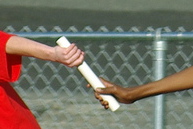Don’t Drop The Ball On Delegation
Posted: December 8, 2012 Filed under: leadership, learning | Tags: business, communication, delegation, lead, learning, motivation, vision Leave a commentI had an experience that allowed me to learn first hand how Not to receive delegation. I am 100% responsible for not addressing this up front, and I was as disappointed as anyone else with the results.
I dropped the ball for someone this summer. I was asked to organize a fund-raiser luncheon in a couple of months. We had a meeting with four of us and some assignments were made. The person in charge was going to make some contacts and get back to me.
I waited to hear from him. I didn’t move forward when I didn’t hear back. I didn’t get invitations out in time, or make contact with donors in time. I didn’t get the job done. I didn’t take the initiative. Looking back, I can see that I didn’t receive specific enough instructions.
We didn’t communicate very clearly who was going to do what. I thought he was doing something that he thought I was doing. It was like two people trying to go through the doorway at the same time and neither one taking the lead, so both of us just got stuck there in the doorway of opportunity.
Regardless, I learned much from this experience and I won’t let it happen again. I found this list a few weeks later and thought how much I could have used this earlier.
5 steps to effective delegation:
1. Make the assignment
2. Let the person perform
3. Offer assistance
4. Receive report
5. Commend the positive, correct any errors
1. Make the assignment: Be specific in what you want from the person. Give them the vision for the end result you would like. What should we both see and experience when this project is finished.
2. Let the person perform: Let them know how and when you will follow-up. If you intend to check in with them every week, tell them that. That way they don’t think you are micro managing them when you call them every Friday to see how things are going.
3. Offer Assistance: Give them information on who and how to get help. If you are providing help, let them know that they can come to you. I always try to remember to over communicate when in doubt.
4. Receive their report when finished: At a specified, when the project is finished or the vision is completed, sit down together and review the results.
5. Commend the positive results, correct any errors: Use the follow-up meeting as an opportunity to break down problems and successes. Make changes for next time.
What is your best delegation failure story?
.
(these are steps from the book Duties and Blessings of the Priesthood part B)
Hiring For The Antarctic, Or: Ask For What You Want
Posted: November 21, 2012 Filed under: history, leadership | Tags: Antarctica, believe, business, communication, ErnestShackleton, hiring, lead, leadership, Management, reading, Simon Sinek, vision 1 CommentWhen I revamped my hiring process this spring, I had to change so many things. First and foremost was my attitude about who I wanted on my team. I then had to decide how I would attract those types of people.
I learned about the attitude I should have in hiring from another book I have referenced before, Start With Why by Simon Sinek.
One of the author’s themes in this book is that you have to appeal to people who believe what you believe.
Simon shares a story that demonstrates the right way to recruit.
.
In 1914, an adventurer named Ernest Shackleton set out with a team of 27 men to cross the Antarctic continent, which had never before been done. They didn’t accomplish their mission. After many storms and being trapped in the ice on their boat for 10 months, they traveled hundreds of miles in their life boats to find help.
Eventually they were saved, and all of them survived the ordeal. Simon, in his book, says that this wasn’t luck, but an example of a great hiring process in action.
Before the expedition, Shackleton ran an ad in the London Times for his crew. He didn’t offer benefits. Simon says that he didn’t offer paid time off or amazing pay. This is what Shackleton’s ad said:
.
“Men wanted for Hazardous journey. Small wages, bitter cold, long months of complete darkness, constant danger, safe return doubtful. Honor and recognition in case of success.”
.
If you advertise for the right type of people, the others will weed themselves out.
Ernest Shackleton got the right men for the job because that’s who he asked for.
.
.
Who do you want on your expedition? Are you asking the right questions?
What’s In A Name?
Posted: November 6, 2012 Filed under: leadership | Tags: business, communication, labels, lead, leadership, learning Leave a comment
I met a client the other day that surprised me with her name.
(Her name has been changed in this post, but the effect is still the same.)
She was in her twenties, has been married for a couple years. She said her husband’s name was Taylor Smith. I shook my head at that, and asked her to repeat herself. I looked at my assistant, and she was as surprised as I was.
Because the client’s name is Taylor Smith.
.
I had never before met someone with the exact name as their spouse.
Now, she went on to tell us about her family, and that she was expecting a baby. I’m sorry, but the first thought that went through my mind was, “Please don’t name the baby Taylor.”
.
What we call things can be so important. In a past post on maps, I addressed one aspect of this. I love to read, and I am writing now, and one thing I have discovered is that finding the right word can be one of the most difficult things when writing.
.
With the right name or label, you can improve understanding and impact.
Does your team call you “boss”? Or are you a “leader”?
Do you have staff? Or employees? Or “team members”?
Now this can be taken to the other extreme, where you get too politically correct, and don’t call things like they are. Or give them incorrect names again. That is not what I am talking about.
.
I like to think of myself as a leader and not a boss. My team has a great place to work, and not just a “job”. My Director of First Impressions is more than a receptionist.
Just be aware of labels you use, and think about the connotations.
.
.
What is your vision? How can your language choices affect your vision and other’s perception of it?
Know Thyself; Lead Thyself
Posted: October 30, 2012 Filed under: leadership, learning | Tags: business, communication, DISC, hiring, Management, personal development, personality types, Strengths-Based, training 1 Comment
I have rediscovered the power of knowledge. Not just generally learning something new, or going to school or reading a book. I discovered that knowing yourself is the most powerful knowledge you can ask for.
I posted about the Strengths-Based leadership book and philosophy a few weeks ago. Recently, in addition to learning about my strengths, I was introduced to the DISC personality profiles. This was another piece of the puzzle for me. I knew people were unique, but having a name for their tendencies helped me know how to better relate and communicate with others.
I learned that I have a stabilizing personality. I learned about the abilities I have in that regard and also the challenges that I bring upon myself.
I also learned how people are different. If you recognize that people respond differently to certain situations and why, it can help in leadership tremendously.
The DISC profile is divided into four categories, and one person may have any combination of these in varying degrees:
D: is Decisive. Quick to action, not overly concerned with people’s feelings.
I: is Influencer. Engages with people readily, and people are drawn to their personalities. They are funny or just talkative.
S: is Stabilizer. Great listeners, careful of others feelings, methodical decision makers.
C: is Cautious. The ultimate rule-follower. Studious and has great concern for “the right way” of doing things. Detail-oriented for sure.
When I learned about these types of personalities, I could see where my results were accurate in myself, but I could see where my wife’s results were spot-on for her too.
It opened up a new vocabulary to me, and I could see things and name personalities right away.
I had my team take the profile quiz, and we learned about how we can work together better. And we do. It’s great to be able to communicate about this with our team, and regarding how to communicate with clients. We have a language we can use now that was untapped before.
Learning about my own personality has helped me open up and communicate with my team more effectively. They have also learned how to work more effectively with me and each other.
Have you ever taken a personality test, like the DISC test? Were the results accurate?



